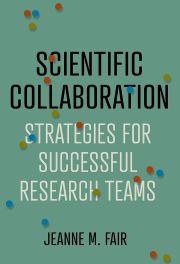Scientific Collaboration: Strategies for Successful Research Teams

Jeanne M Fair
Johns Hopkins University Press, £50.00
Beyond excelling in technical competencies pertinent to their respective fields, scientists must now also establish strong professional connections to achieve their research objectives. This is because the era of solitary researchers following their intuition has largely faded, making way for strategically targeted endeavours undertaken by multidisciplinary teams and often international networks.
Given this context, this guide aims to help scientists become proficient in communication, enhance their collaborative skills and cultivate effective working relationships. The author interweaves numerous real-life anecdotes from her storied career (pun intended) as an animal disease ecologist and biosecurity researcher as a nifty means to introduce the principles fundamental to successful scientific collaboration.
These captivating narratives illustrate how to inculcate such core values as integrity, trust, empathy, community, allegiance and communication within an eclectic team of potentially egotistical individuals brought together to reach a collective research goal. Perhaps just as informative is the open and honest inclusion of stories of ‘how not to’ collaboration disasters.
Written in a conversational style, the remarkably engaging result is a detailed framework for raising research productivity, in any discipline, which acknowledges the complexity of the human character and seeks to retain enjoyment of the process of scientific investigation. Junior scientists and group leaders alike would find value in reading this book to help them navigate the contemporary landscape of publicly accountable, highly scrutinised, fast-paced, large-scale research.
Prof Andrew Taylor-Robinson CBiol FRSB
Reviewed by Professor Andrew Taylor-Robinson CBiol FRSB, Professor of Microbiology & Immunology, College of Health Sciences, VinUniversity, Hanoi


